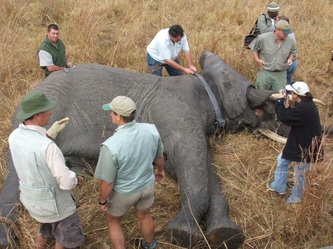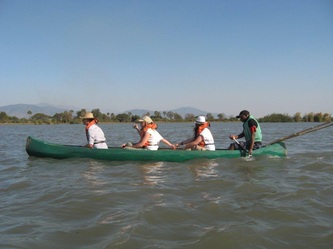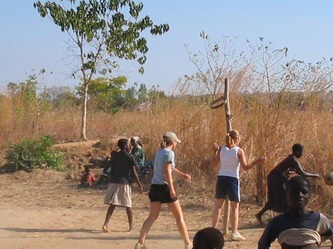What MEL achieves
Charity Status
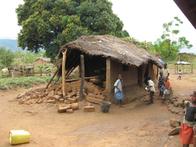
A local teachers house
Malawi Education Link has been officially registered as a UK charity (1108460) for some years now.
Since MEL works only within a 25km radius of Ngala village, it is registered there under Senior Group Village Headman Kamkondo’s Community Based Organisation, Likuchi CBO. This gives us most of the benefits of national registration and also means that only local communities influence and benefit from our funds. It also means that no moneys are ‘diverted’ to non-local parties and therefore the vast majority of our fundraising reaches its intended beneficiaries.
Since MEL works only within a 25km radius of Ngala village, it is registered there under Senior Group Village Headman Kamkondo’s Community Based Organisation, Likuchi CBO. This gives us most of the benefits of national registration and also means that only local communities influence and benefit from our funds. It also means that no moneys are ‘diverted’ to non-local parties and therefore the vast majority of our fundraising reaches its intended beneficiaries.
Constitution
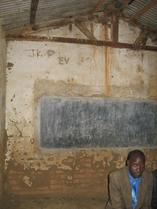
A typical classroom block
- Unlike most charities of its kind, MEL works directly with the communities, villagers wanting to improve the educational provision their children receive. While using the data on school rolls, classroom:teacher ratios etc., provided by the local Primary Education Advisers, Caroline also ensures that those communities do their share: they must provide those building materials that are within their capability to bring to the project, such as bricks (made locally), sand and water. MEL uses its hard earned funds to buy cement, roofing tin, window frames and other items outside the purchasing power of villagers who are mostly subsistence farmers. Additionally, the communities identify and take responsibility for a building team, paid a nominal sum (typically a total of £500 for building a double classroom block) by MEL.
- This method of working ensures the ongoing involvement of the community concerned: they have ownership of their school, taking responsibility for and pride in its maintenance in future years too.
- wherever possible, local skills, materials, labour are used: door and window frames are made by the Mwalawathendo Brothers in Dwangwa; doors are made with local timber by local carpenters; local lorries provide transport; local traders are encouraged to compete for our custom in cement, hardware... This ensures that the spin off benefits of our presence are felt as widely, in the local area, as possible.
Ngala
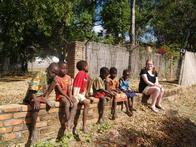
Children at Ngala
Ngala is a small village about 17 kms north of Dwangwa. It lies on the M5, the only asphalt road running along the lakeshore. There’s a small trading centre which becomes a hub of activity on Mondays, market day, and there’s a small clinic, bus stop.
People from the more remote villages will walk for hours to buy and sell their produce there. Ngala Beach Lodge is also there, providing local employment and housing MEL teams. Caroline’s house, Basilis House, is used to provide breakfasts, lunches, overspill accommodation and store the resources, materials used by the teams.
More details about Ngala and Malawi
People from the more remote villages will walk for hours to buy and sell their produce there. Ngala Beach Lodge is also there, providing local employment and housing MEL teams. Caroline’s house, Basilis House, is used to provide breakfasts, lunches, overspill accommodation and store the resources, materials used by the teams.
More details about Ngala and Malawi
Malawian Schools
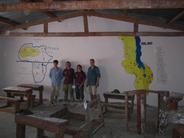
Decorating a classroom
- MEL has, to date, worked with over 39 different schools, most of them within a 20 mile radius of Ngala. In the early days, these were mostly schools along the lakeshore, easily accessible by teams.
- As our influence spread and communities came to hear of how we could help them help themselves, so representatives of more remote schools came to ask us to work with them. These include schools such as Chivumu, Kazomba, inaccessible by road, until recently, and where no mzungu (European) has ever been before.
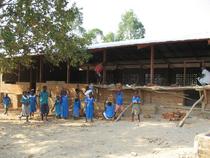
Khuuyu School pupils moving bricks
- While the vast majority of MEL’s work consists of building primary school teaching blocks, so that children can have their basic, essential education sheltered from rain, sun and cold (in May and June), we also help with:
- building teachers’ houses: the government will pay the wages of a teacher for whom the community has built a tin-roofed house. Such houses encourage a better standard of teacher to the school
- the maintenance and/or rebuilding of earlier constructions: communities may have only been able to build with dambo sand as mortar, easily washed away by heavy rains
- improving the appearance, quality of classrooms simply by lime washing, the stenciling / painting of teaching resources onto classroom walls. In the absence of electricity, the only teaching resource is a chalkboard.Team members augment this with whatever charts, illustrations, tables the teachers ask for.
Sponsorship
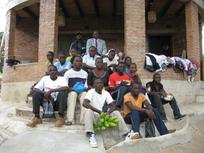
Sponsored Students
veroDonors and supporters sometimes wish to specify how their funds are to be used. This can usually be achieved and will be personally monitored by Caroline.
- MEL sponsors some orphans, or other students from no income families in the local secondary school, Dwasulu Community Day Secondary School. This costs approximately £30 per student per year.
- Sponsors sometimes befriend an individual and wish to support them through, for instance, a higher secondary school or a school offering specialist teaching (for the deaf) or even university, in the case of teachers.
- specific requests on how donations are to be spent can usually be accommodated and feedback will be provided. Past requests have included: benefiting AIDs orphans (these are usually brought up by relatives, often elderly grandmothers); secondary schoolgirls; village clinics...
